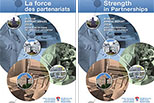
Innovative biosensor technology reveals secrets of how drugs work
What if we could take advantage of a drug’s benefit without side effects? Stéphane Laporte, PhD is conducting research in his laboratory at the Glen...

How does cancer spread?
How does cancer spread? While studying human brain tumour cells, a team of scientists at the Research Institute of the McGill University...

Another Medical Cold Case Cracked by the MUHC’s ‘Dr. House’
A team from the Research Institute of the McGill University Health Centre (RI-MUHC) led by Dr. Donald Vinh, the RI-MUHC’s so-called...

The 2018 RI-MUHC Annual Report is online!
We invite you to view the online version of the 2018 Annual Report of the Research Institute of the McGill University Health Centre (RI-MUHC)...

Can a smart app encourage HIV-self testing in Canada?
HIV self-testing strategies have been recommended by the World Health Organization (WHO) since 2016, as they empower people to find out...

Scientists identify new genetic causes linked to abnormal pregnancies and miscarriages
A team of scientists at the Research Institute of the McGill University Health Centre (RI-MUHC) and McGill University have identified...

Can't sleep? Fruit flies and energy drinks offer new clues
Sleep is an essential behavioural state in animals ranging from invertebrates to humans. It is critical for immune function, stable metabolism...

Cracking the Genetic Code of type 2 diabetes
Once you have diabetes, it is difficult to stop its progression and once diabetic complications set in, they are usually irreversible...

First annual Trottier-Webster Research Innovation Competition announced by the MUHC Foundation
The McGill University Health Centre Foundation, along with the Research Institute of the McGill University Health Centre (RI-MUHC), is pleased...

More than a research hospital, a hospital driven by research
The McGill University Health Centre (MUHC) is proud to be once again highly ranked in Research Infosource's prestigious list of Canada's Top 40...
